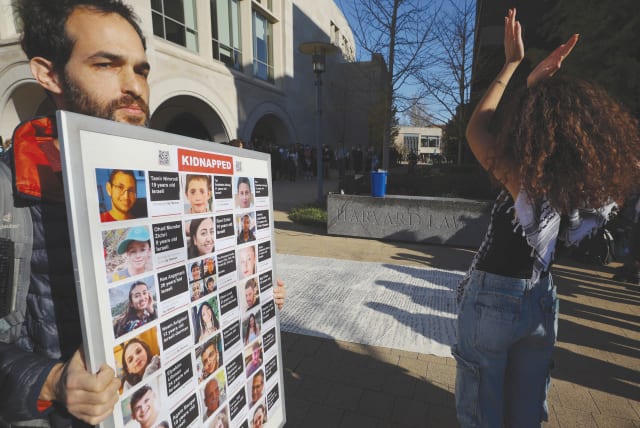Academia has become a new battlefield in the Israel-Hamas war - opinion

Jewish students need to feel – especially in current circumstances – that they are not alone.
We like to say that hard work and perseverance yield results and success. The opposite is also true: Neglect results in failure and crises. This analogy aptly describes Israel’s inability to deal with the crisis of anti-Israel sentiment and antisemitism at the world’s leading academic institutions, and the resulting difficulties now faced by thousands of Jewish students on campuses across the United States.
For many years, Israeli governments neglected this issue. They preferred to deal with issues of direct concern to Israel, such as security, defense, and foreign affairs. Gradually, Israel’s involvement with leading academic institutions diminished.
When a vacuum is created, opportunities arise. In this way, the global academic arena, which has become increasingly focused on human rights, gender equality, LGBTQ+ affairs, and especially the Israeli-Palestinian conflict, has been taken over, practically in its entirety, by anti-Israeli and anti-Zionist forces.
This is painful and problematic for several reasons. The first concerns the connection with Jewish students worldwide. There are currently about 800,000 Jewish students across the world, with many of them studying at prominent institutions. A considerable number of these students consider themselves campus ambassadors of the Jewish people and the State of Israel.
Are students feeling isolated?
These students need to feel – especially in current circumstances – that they are not alone. They need support and assistance, they need knowledge and ability to face radical antisemitic elements, and they need Israeli involvement in academia that will give them legitimacy and tools to stand by Israel, even in these challenging times.
Secondly, and no less importantly, Israel must cultivate relationships and influence at leading academic institutions. Whether we like it or not, the next generation of world leaders will emerge from top universities in the United States in the coming decade. Israel has no choice but to be involved and obtain as much influence as possible in these critical power centers. We must find ways to convey the Israeli narrative and address the challenges in these institutes to influence future world leaders.
As Qatar buys clout in student unions and influences narratives at top academic institutions, Israel appears to be surrendering the battle. Eight US presidents have graduated from Harvard University. Other presidents have come from Columbia, the University of Pennsylvania, and Yale. What do all these institutions have in common? They all are academic institutions that are currently at the heart of the anti-Israel storm, and all of them are witnessing antisemitic protests.
The war has many arenas; the battlefield is just one of them. There are further, critical arenas such as social networks and global media, and it would not be an exaggeration to say that the academic arena is one of the most important. Israel, however, has surrendered on that front.
The writer is the chairman of Israel’s National Student Union.
Jerusalem Post Store
`; document.getElementById("linkPremium").innerHTML = cont; var divWithLink = document.getElementById("premium-link"); if (divWithLink !== null && divWithLink !== 'undefined') { divWithLink.style.border = "solid 1px #cb0f3e"; divWithLink.style.textAlign = "center"; divWithLink.style.marginBottom = "15px"; divWithLink.style.marginTop = "15px"; divWithLink.style.width = "100%"; divWithLink.style.backgroundColor = "#122952"; divWithLink.style.color = "#ffffff"; divWithLink.style.lineHeight = "1.5"; } } (function (v, i) { });
